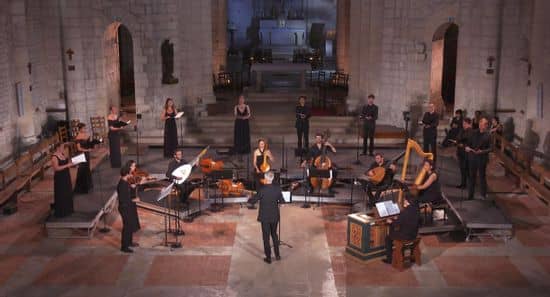Membra Jesu Nostri • Dietrich Buxtehude
A century after the bloody episodes of the wars of religion between Catholics and Reformed, Europe found a relative serenity in the 17th century. On each side, the great religious services took on fundamentally opposite appearances: the Catholics, under the influence of the counter-reforms, sought to influence with demonstrations and pomp, while the Protestants favored a form of austerity aimed at getting the faithful to concentrate on the scriptures alone. Yet both groups simultaneously adopted new practices of domestic devotion with many similarities.
A tradition of spiritual concerts, outside of the liturgy, which put music in the foreground, developed in Europe. In Paris, at the Hôtel de Guise, sacred music found its place in the daily life of the pious Princess de Guise who commissioned her resident composer, Marc-Antoine Charpentier, to write numerous musical pieces to be played either during special services in her chapel or during evenings when she invited a circle of friends, intellectuals and artists.
On the other side of the Rhine, in the north of Germany: the Abendmusik concerts of the Church of St. Mary in Lübeck were created in the middle of the 17th century by Franz Tunder, and quickly became a famous Advent event. Revived by Dietrich Buxtehude, they take on another dimension. This tradition (which lasted until the 19th century!) reveals a more general practice of devotion: it takes place throughout the year and shows to what extent music occupies a central place in Lutheran devotion. Two lieder are associated with the 7-cantata cycle Membra Jesu Nostri in this program: Klaglied, composed for the death of Buxtehude’s father, and Herzlich hab ich dich O Herr.
In line with the musical identity of the ensemble Correspondances developed since its creation on the intimate repertoire composed by Charpentier for his patron, the Princesse de Guise, this program offers a magnificent and rich setting for choir and ensemble.
This program was recorded at the Abbaye aux Dames and was published in March 2021 by the Harmonia Mundi label. It also received the Choc de Classica award.
With the support of la vie brève – Théâtre de l’Aquarium.
Anciennes dates
Buxtehude · Membra Jesu Nostri & autres lieder
Festival de Rocamadour
Buxtehude · Membra Jesu Nostri & autres lieder
Festival Misteria Paschalia, Cracow (Poland)
Buxtehude · Membra Jesu Nostri & autres lieder
Festival Actus Humanus, Gdansk (Poland)
Buxtehude · Membra Jesu Nostri & autres lieder
Buxtehude · Membra Jesu Nostri & autres lieder
de Doelen
Buxtehude · Membra Jesu Nostri & autres lieder
Concertgebouw
Buxtehude · Membra Jesu Nostri & autres lieder
Mars en Baroque
Buxtehude · Membra Jesu Nostri & autres lieder
Théâtre de Caen
Buxtehude · Membra Jesu Nostri & autres lieder
Festival de Música Antigua de Sevilla
Buxtehude · Membra Jesu Nostri & autres lieder
Chapelle Corneille, Rouen
Buxtehude · Membra Jesu Nostri & autres lieder
La Soufflerie
